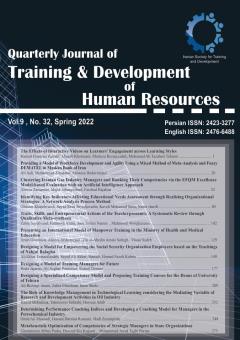Identifying The Faculty Development Based On Entrepreneurship (Case study: Payame Noor University, Hormozgan Province)
Subject Areas : روش های نوین آموزش وتوسعه منابع انسانیYusef Mahmoodi khamiripoor 1 , Nadergholi GHourchian 2 , mohamadnoor rahmani 3
1 -
2 -
3 -
Keywords: DevelopmentFacultyEntrepreneurshipTheme,
Abstract :
Faculty development based on entrepreneurship can lead to the evolution and promotion of educational and research areas in according to entrepreneurial goals, and then it can be expected that the output of these developments, researchers and innovative students, which defines the power, the problem. And provide creative solutions for business and industry goals and continuous quality development in various activities and missions of the university. Faculty development based on entrepreneurship approach is an attempt by the academic system to reform the knowledge, attitude and skills of professors in the form of training, retraining, study opportunities, scholarships and in according to entrepreneurial goals. To succeed in advancing the process of Faculty development based on entrepreneurship to optimal policy, a set of key factors should be identified. In this article, the researcher uses the analysis of the theme to identify the factors affecting the Faculty development based on entrepreneurship at the University of Hormozgan province. For this purpose, with interviews conducted with expert people in this field.71 basic themes, along with 25 organized themes, were identified based on the deduction of the researcher in 5 inclusive dimensions including individual development, organizational development, Educational development and professional development were categorized and eventually resulted in scientific and operational suggestions.
1. Abdelkarim, A. Toward Establishing Entrepreneurship Education and Training Programmes in a Multinational Arab University. Journal of Education and Training Studies, 2019; 7(1): 1-9.
2. Audretsch, D.B. From the Entrepreneurial University to the University for the Entrepreneurial Society. The Journal of Technology Transfer,2014; 39(3): 313-321.
3. Greavenitz, georg von. Harhoff, dietmar. Weber, Richard,” The effect of entrepreneurship education”, Journal of economic behavior organization,2010: 90-112.
4. Kuttim, M. Kallaste, m vensaar, U.and kiss. A. Entrepreneurship Educational University Level and students Entrepreneurial Intentions. Procedia-social and Behavioral science. 2014; 110: 658-668.
5. Mohd, Z. Developing a preliminary questionnaire for the faculty development programme needs of medical teachers using Delphi technique. Journal of Taibah University Medical Sciences.2019; 14 (6): 495-501.
6. Patricia L.K., & Kathleen S. Academic Morphing: Teaching Assistant to Faculty Member. University of Nebraska – Lincoln. Online at: www.digitalcommons.unl.edu.2020.
7. Sasmito, A.P. Conceptual Model for Improving Quality of Teacher in Indonesian Vocational School. International Journal of Evaluation and Research in Education,2020; 9(1): 39-40.
8. Zappe, S.E., Yoder, J.D., & Hylton, J. B. Assessing Curiosity in the Engineering Entrepreneurship Context: Challenges and Future Research Areas. Advances in Engineering Education.2018; 7(1): 1-10.
9. Kuratko, D., & Hodgetts, R. Entrepreneurship: Theory, Process, and Practice, South-Cincinnati OH (USA): Western College Publisher.2017.
10. McAfee, O. Current Characteristics of Faculty Development in Public Two-year Colleges in Arkansas. (Doctoral Dissertation), University of Capella.2008.
11. Clark, Burton R. Creating Entrepreneurial University: Pathways of University, IAU And Elsvier science.1998.
12. Hermina, U.N. The Model of Employee Performance. International Review of Management and Marketing.2019; 9(3): 69-73.
13. Jamshidi, l. Study of the Faculty at Shahid Beheshti University and Provide Model for continuous improvement Masters Thesis. Tehran: Shahid Beheshti University.2007.
14. Shane, S. and S. Venkataraman. The promise of entrepreneurship as afield of research; Academy of Management Review.2000; 217-226.
15. Etzkowits, H. "The Evolution Of Entrepreneurial University" , International Journal Of Technology and Globalization.2004; (1): 64-77.
16. Kerbi, D. A. Creating Entrepreneurial Universities in the UK: Applying entrepreneurship theory to practice. Journal of Technology Transfer.2005; 31(5): 559-603.
17. Jacob, M., Lundqvist, M.; Hellsmark, H., “Entrepreneurial transformations in the Swedish University System: The case of chalmers University of Technology”, Research policy.2003; 32(9): 1555-1569.
18. Ropke, J. The Entrepreneurial University: Innovation, Academic knowledge creation and regional development in a globalized economy, Department of economics, Philipps-unversitat Marburg, Germany.1998.
19. Dill, DD. “University- industry entrepreneurship: The organization and management of America university technology transferunits”, HigherEducation,1995; 29(4): 369-384.
20. Jaffe DT, Scott CD. Empowerment. Iran nejad M, editor, 1st ed. Tehran: Institute of Education and Research in Management. 2004; 85-110. (Persian).
21. Murray, J.P. Faculty Development in Texas Two-Year Colleges. Community College Journal of Research and Practice.2017; 24(9): 251–267.
22. Tam, T., PhungHang, B., Doung, G., & Clean, N.M. faculty development in southeast asian higher education: a review of literature. Education Research Institute, seoul National university.2016.
23. Beth, D. Teaching the teachers: Faculty development in inter-professional education. Applied Nursing Researc.2005; 28(1): 31-35.
24. Van cann, R. Universities and Incubators. Expert from thesis entitled. Key decisions in the start-up phase if successful software Companies.2013.
25, Braun, V., & Clark, V. Using thematic analysis in psychology. Qualitative in psychology.2006; 3(2): 77-101.
26. Boyatzis, R. E. Transforming qualitative information: Thematicanalysis and code development, Sage.1998.
27. Attride – Stirling, J. Thematic networks: an analytic tool for qualitative research. Qualitative research,2001 ;1(3): 385-405.


